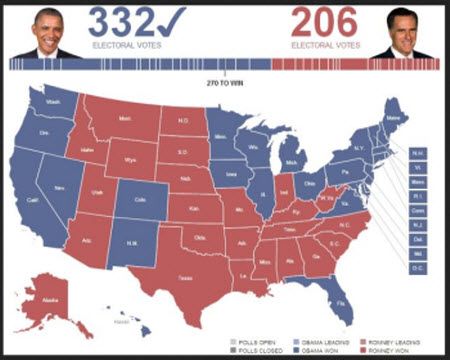 |
| Seen above, an illustration of a dispute between Blue and Red states. |
When asked the question of whether American's political culture is conflictual or consensual the answer can be easily seen throughout past historical elections and present-day protests. The separation between states is probably the most familiar example of conflictual political culture. Each society in the U.S is a faction that varies from the next. People are divided by their political party, which is seen commonly during elections. A video by Vox titled "The bad map we see every presidential election" exclaims how divided each presidential map of election turnout actually is. The separation between Red and Blue states is almost too close to call by looking on a map so much that, other methods of presenting election data have been considered but not widely adopted. During the 2012 Obama vs. Romney election results were so close being 206 for Romney and 332 electoral votes for Obama. American Political culture as a whole is divided by these two parties, being Republican and Democrat. As Alaina said in her post, states are categorized by their amount of electoral votes and their classified party. But this division does not stop with these elections.
The divide of political culture can be seen through your surroundings. According to writer Brooks, cities are more liberal and rural areas tend to be more conservative. Different communities can even be classified differently. The conservative side can be presented through stereotypes of hardworking, religion-oriented, more self-reliant, and real-world based. While liberals focus more on accomplishments, respect, diversity, helping everyone no matter their background, and success. These stereotypes create even more debate, while Liberals and Conservatives don't see eye to eye on certain topics that involve things such as religion-based issues and the way we perform in our government. These issues further separate us as a whole, making our government more conflictual than consensual.
|

No comments:
Post a Comment
Note: Only a member of this blog may post a comment.